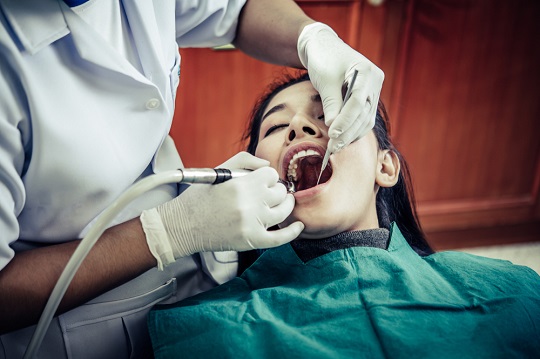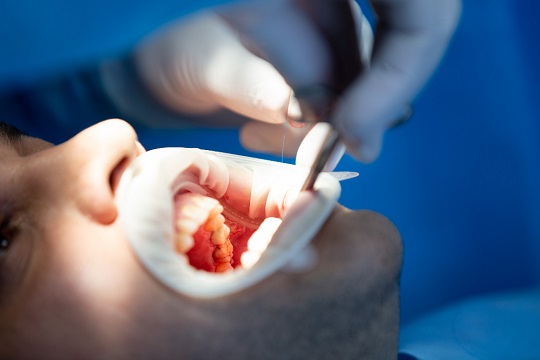Wisdom Teeth Extraction: How Does It Work? Is It Painful?
 Wisdom teeth, also called eighths, are molars that, in most cases, grow in adulthood or adolescence. These are four molars located in the innermost part of the dental arch, both upper and lower.
Wisdom teeth, also called eighths, are molars that, in most cases, grow in adulthood or adolescence. These are four molars located in the innermost part of the dental arch, both upper and lower.
These dental elements are called “of judgment” since they appear approximately between the ages of 17 and 25, an age in which one is led to be more mature and responsible. However, cases of hyperemia or exodontia are not rare, i.e. those cases in which the wisdom teeth are more or less than four. It is also possible that wisdom teeth never appear because they are totally absent, or that they remain under the gums, without the possibility of being seen except with an overview or that they only partially emerge, remaining halfway.
Wisdom teeth are those dental elements that tend to appear around the eighteenth year of age. All patients who find themselves forced to extract one or more eighths wonder if the extraction will be painful and how the removal of the teeth will take place.
Wisdom tooth extraction is a very common operation and does not differ from the extraction of other teeth.
Tooth extraction itself is not painful, as it is performed under local anesthesia. The pain related to the extraction may arise later, in the post-operative period. To overcome this problem, the dentist usually recommends the application of ice to reduce inflammation and swelling and, if this is not sufficient, recommends the administration of NSAIDs (non-steroidal anti-inflammatory drugs).
Immediately after extraction, thanks to the aid of the laser and abundant irrigation of the alveolus with hydrogen peroxide and betadine, we will obtain optimal disinfection of even the deepest tissues. This will help limit the inflammation of the areas surrounding the extraction, making the post-operative path less annoying.
However, the pain related to the extraction should not discourage the patient, as this operation could spare him much more intense pain related to pathologies such as caries, cysts or other complications at the gingival level. If wisdom teeth do not grow properly, in fact, they can cause serious problems that should not be underestimated.
How Are Wisdom Teeth Extracted?
The extraction of the eighths takes place like the removal of other teeth, therefore with the aid of pliers or other tools capable of gripping the molar to uproot it. However, there are two techniques, the first, the classic one, through the use of pliers and the second so-called “lever ” capable of avoiding the fracture of the tooth during extraction.
When the tooth is completely or partially impacted, the doctor will make an incision in the gum to remove it. After the extraction, again in order to facilitate less invasiveness and accelerate healing, it is possible to use a “socket preservation ” therapy. This protocol consists in inserting a filler inside the socket and a supra-alveolar seal using an autologous membrane. This process induces a more effective immune response and easier and painless healing.
Does Removing A Wisdom Tooth Hurt?
Not all cases are the same and for this reason wisdom tooth extraction can be more or less painful based on the psychophysical condition of the patient and the complexity of the intervention. It is also up to the dentist to implement techniques capable of not causing severe trauma during the extraction phase and to choose the right post-extraction protocols to facilitate healing.
The lever technique, in fact, is less traumatic than the use of the classic pliers which could cause the tooth to fracture. Thanks to the lever, the tooth can be extracted faster and more safely. Furthermore, thanks to the administration of anesthesia, the patient could only feel discomfort without experiencing any pain during the surgical operation.
In case the tooth is impacted or partially impacted, the operation is more complicated as it may be necessary to make an incision to reach the tooth. In addition to the incision of the gum, it may be necessary to break the dental element into several pieces to facilitate its removal. In case of tooth removal including the recovery process may be longer than the extraction of a tooth already completely erupted. Barring the onset of particular complications, in principle the healing process is not particularly painful for the patient and the appearance of acute pain generally occurs only in the 24 hours following the operation.
Why Do Wisdom Teeth Sometimes Fail To Erupt?
It is not so rare that wisdom teeth do not come out, the lack of eruption is essentially due to two reasons:
- The absence of space in the upper or lower arch
- Wrong orientation of the tooth in the growth phase
In the event that the teeth grow crooked or grow only partially, pathologies such as gingivitis, tooth decay, abscesses and cysts could occur. Furthermore, during the eruption process of the eighths, cases of pericoronitis are not uncommon, an inflammation accompanied by severe pain involving the gum, which appears swollen and red. If the inflammation is quite acute, the pain can spread throughout the jaw, radiating to the ears and neck, causing major chewing problems or difficulty opening and closing the mouth. In this case it is essential to contact a dentist who will be able to intervene promptly in a targeted and correct way to solve the problem and eliminate the inflammation.
Since wisdom teeth often lead to pathologies and interfere with the correct alignment of the teeth already present on the dental arches, they tend to be extracted rather than restored through root canals or fillings.
What Are Wisdom Teeth Used For?
It is now established that the eighths are useless for chewing and, even on an aesthetic level, their presence is irrelevant as they are not visible unless the mouth is opened wide.
Today wisdom teeth have no function but their presence can be linked to human evolution. It is in fact a genetic factor inherited from Homo sapiens, primitive man, who by feeding on hard and often raw foods needed stronger teeth to be able to chew effectively. In the modern era, the diet has changed considerably, it is in fact composed of soft and easy to chew foods that do not require the presence of additional teeth.
One of the factors that leads to the malformation of these teeth or their lack is the conformation of the maxilla and mandible, today smaller than the man of 300,000 years ago.
When Should Wisdom Teeth Be Removed?
Wisdom tooth extraction is a fairly common practice. To prevent or counteract certain pathologies, the eighths are extracted, completely removing the tooth and the root. To prevent any problems, in case of insufficient space, it may happen that the teeth are removed even before they come out of the gum.
Among the reasons for their extraction there are various pathologies that cause serious problems or pain such as:
- caries
- damaged or misshapen teeth
- teeth growing crooked or misaligned
- teeth are not fully developed
- teeth that remain included in the gum or, worse, in the bone with the risk of cyst formation
- teeth growing horizontally instead of vertically
- teeth are broken or chipped
- Partially growing teeth, creating a particularly suitable place for the proliferation of germs and bacteria and a consequent possibility of the formation of caries.
Wisdom teeth are not a problem for everyone, in fact, in many cases, they erupt without complications and it is possible to live with them without any problems. As always, it is essential to maintain proper oral hygiene, taking care to brush and floss up to eighths.
 The Causes Of Gingivitis
The Causes Of Gingivitis
There can be many agents that trigger gingivitis: in the first place, incorrect oral hygiene which causes the accumulation of plaque; the smoke ; an irregular diet low in fruit and vegetables ; excessive consumption of alcohol and sugars .
In some cases, however, bleeding gums can be attributed to more serious diseases such as leukemia, as this disease inhibits the production of platelets, making it difficult for blood to clot. The same problem can occur if you suffer from idiopathic thrombocytopenic purpura, which like leukemia causes a decrease in platelet production.
Some medicines, especially anticoagulants, can also lead to bleeding. In women, bleeding from the gums may occur regularly with the menstrual cycle, or if you are pregnant. In fact, the hormonal change in pregnant subjects can cause the onset of periodontal disease.
But when should you really worry?
Certainly if when you brush your teeth you frequently notice blood on your toothbrush.
If the disorder is in fact persistent and chronic, surely our gums are not healthy and we need to immediately contact a doctor to ascertain the causes of the bleeding.
When Gingivitis Becomes Chronic
The problem is considered chronic when it no longer occurs sporadically, but begins to occur at increasingly reduced intervals, or daily. In this case, in fact, it is possible to exclude traumas caused by too energetic and excessive brushing and to orient oneself with certainty towards the presence of a pathology of the oral cavity.
Remember that healthy gums have a well-defined appearance. First, they must adhere perfectly to the tooth, and must form an arch that fits into the space between one tooth and another. The gums should also never be red or swollen.
If you want to be sure of the presence and extent of the problem, you can do a sort of litmus test before consulting a doctor. First you need to take a handkerchief or in any case a piece of paper and dab the gums, passing an ice cube over it. In this way, by detaching the handkerchief, it will be possible to verify the presence and extent of gingival bleeding.
Gingival bleeding can be the alarm bell of even very serious problems, it should never be taken lightly, and it is always necessary to contact your dentist for a correct diagnosis.…

